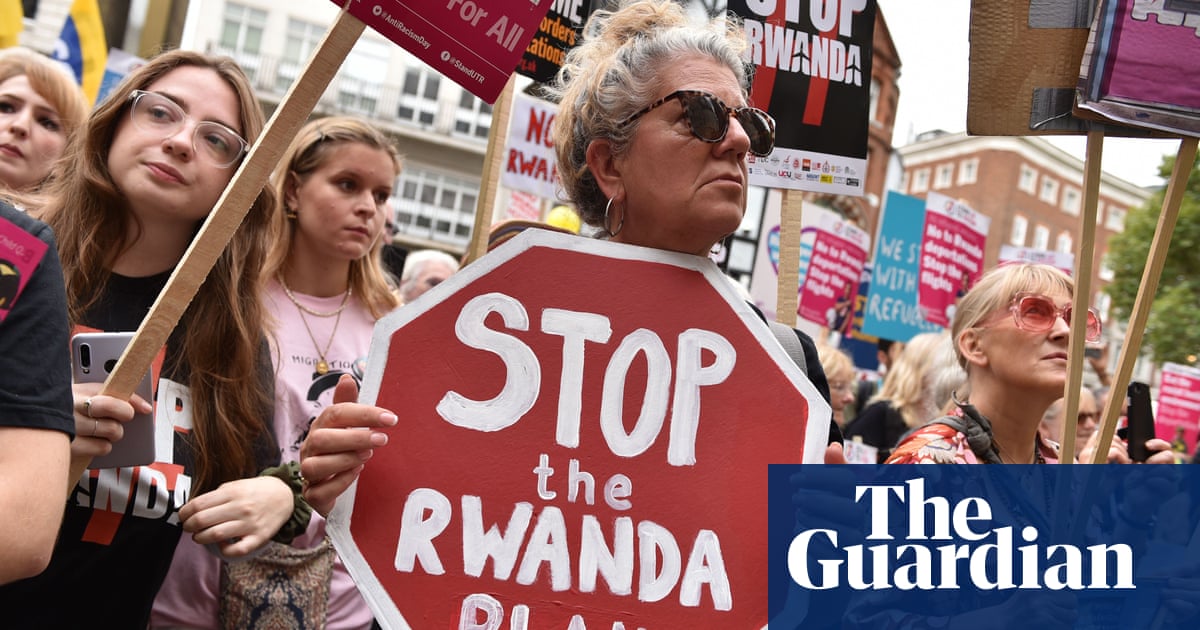
The new government commission on racial inequalities is being set up by a No 10 adviser who has cast doubt on the existence of institutional racism and condemned previous inquiries for fostering a “culture of grievance”, it has emerged.
Munira Mirza, the head of the No 10 policy unit, is leading much of the work to form the commission on race and ethnic disparities announced by Boris Johnson on Sunday after the global wave of Black Lives Matter protests, the Guardian has been told.
It is understood that Mirza has said she hopes to recruit Trevor Phillips as part of the commission. Phillips, a former chair of the Equalities and Human Rights Commission, would be a controversial choice, having previously referred to UK Muslims as being “a nation within a nation”.
When Phillips was named as playing a role in a Public Health England inquiry into the disproportionate impact of Covid-19 on people from black, Asian and minority ethnic backgrounds, it prompted condemnation from campaigners.
The revelation of Mirza’s role was met with dismay from experts and MPs. The shadow justice secretary, David Lammy, whose own review on inequalities in the judicial system was criticised by Mirza, tweeted on Monday evening that the appointment “further undermines” Johnson’s race commission.
The Labour MP added: “My review was welcomed by all parties: Corbyn, Cameron and May. But Munira Mirza went out of her way to attack it. Johnson isn’t listening to #BlackLivesMatter. He’s trying to wage a culture war.”
The Institute of Race Relations thinktank said it would be hard to have confidence in the commission’s outcomes.
“Any enquiry into inequality has to acknowledge structural and systemic factors. Munira Mirza’s previous comments describe a ‘grievance culture’ within the anti-racist field and she has previously argued that institutional racism is ‘a perception more than a reality’,” a spokesperson said. “It is difficult to have any confidence in policy recommendations from someone who denies the existence of the very structures that produce the social inequalities experienced by black communities.”
The Labour MP Diane Abbott, a former shadow home secretary, said: “A new race equalities commission led by Munira Mirza is dead on arrival. She has never believed in institutional racism.”
The government commission, which was revealed in a Daily Telegraph column by Johnson, was also condemned by Labour as overly vague, “written on the back of a fag packet” and adding delay rather than urgency.
Mirza, who is also understood to be leading efforts to recruit commission members, has been an outspoken critic of previous government attempts to tackle structural factors behind racial inequality.
She condemned an audit of racial inequalities in public services commissioned by Theresa May, which No 10 say will form part of the basis of the new commission. Writing for the Spectator in 2017, Mirza said the audit showed how “anti-racism is becoming weaponised across the political spectrum”.
In the same article, Mirza criticised two other reports which Johnson’s government has promised to act on: the one written by Lammy when he was a backbencher, and another on unequal pay among ethnic groups. Mirza said both showed “wrongheaded thinking about race”.
Dawn Butler, a Labour MP and former equalities minister, said Mirza’s role “undermines its credibility from the very outset by appointing someone who stands by Johnson’s racist comments, rejected the Lammy review, saying ‘institutional racism’ is ‘a perception more than a reality’, and opposed Theresa May’s very own racial disparities audit.
“I am tired of fighting the government on this issue. The only review needed is a review into all the past consultations and reviews as well as their failure to implement over 200 prior recommendations.”
Zubaida Haque, the interim director of the Runnymede Trust, a leading race equality thinktank, said the prime minister bore ultimate responsibility for the commission, however. “There are several members in this government who were not strong supporters of Theresa May’s race disparity audit including Munira Mirza, Boris Johnson’s own adviser in No 10. But we must remember that it’s the prime minister who’s in charge here and it’s the prime minister who needs to be held accountable for his words and actions, not his advisers.”
Johnson announced the commission in two lines of an article for Monday’s Telegraph otherwise devoted to arguing against the removal of historical statues and condemning protesters, and in brief TV comments that referenced a desire to end “the sense of victimisation”, which were described by critics as unhelpful.
No 10 said later it would “look at wider inequalities, including issues faced by working-class white boys in schools, for example”. Its remit and members will be announced in due course, a spokesman said. The report, which will also examine some non-racial inequalities, will be completed by the end of the year.
Speaking to the BBC on Monday morning, Lammy condemned the plan as overly vague, and a way to delay implementing recommendations from his and other reports. “It’s because this was written on the back of a fag packet yesterday, to assuage the BLM protests,” he said. “Get on with the action. Legislate. Move. You’re in government – do something.”
Simon Woolley, the director of Operation Black Vote and chair of the government’s Race Disparity Unit advisory group, also warned the commission must implement existing recommendations rather than going over old ground.
“This should not be a fact-finding inquiry,” said the crossbench peer. “This should be framing a comprehensive action plan to reform those key areas that Boris Johnson has acknowledged that have systemic racism.”
Mirza, a one-time supporter of the Revolutionary Communist party, who spent eight years as Johnson’s deputy mayor for culture in London, has been an outspoken critic of anti-racism and what she called “its culture of grievance”.
In the Spectator article, she took issue with Lammy’s review into the justice system by saying that in some ways, people from BAME backgrounds have “more favourable treatment compared with whites”.
In a blogpost from 2018, Mirza argued that injustices were only treated seriously if there was “a social justice angle that can be divined (or manufactured)”.
These views chime to an extent with Johnson’s attempts to reframe the debate about the mass protests after the killing of George Floyd by police in Minneapolis in terms of opposition to removing statues, and his view that more should be done to talk up positive experiences about race.
“What I feel most strongly is that there are so many positive stories that are not being heard,” he told reporters in Downing Street on Monday. “Things really are changing. You’re seeing young black kids now doing better in some of the most difficult subjects in school than they were ever before, more going to top universities.”
Addressing MPs in the Commons, the home secretary, Priti Patel, confirmed the government was backing a plan by some Tory MPs for a new law imposing heavier prison sentences on protesters who vandalise war memorials, after a statue of Winston Churchill in Parliament Square was defaced during a BLM demonstration.
This prompted counter-demonstrators, including those from far-right groups, to protest in Westminster on Saturday. Patel said about 2,000 “racist and far-right hooligans” attended, some of whom threw smoke bombs at police.
Patel said more than 210,000 people attended demonstrations across the country over the weekend at about 160 protests.
Asked about Mirza’s role and the concerns around it, a No 10 source highlighted Johnson’s comments on Tuesday about the value of the commission’s work.












